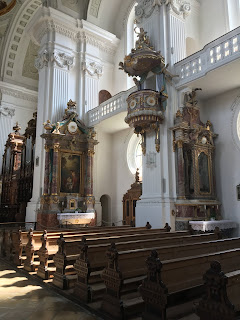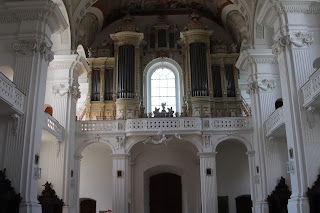Rott was on the 2019 list. Sometimes described as JM Fischer's masterpiece I have to admit I really can't remember whether I went there in the 80s or 90s. My memory of the 2019 visit is quite clear. This is not an interior which overwhelms or shouts at you. It was early afternoon. What a difference the time of day and weather can make to a visit! Immediately, I felt here is a connoisseurs' building. It is less pretentious than Ottobeuren and Zwiefalten. Sublime, I think .Perhaps the pale sunlight and the attractive village outside had something to do with it.
This Benedictine Abbey church was built 1758-63 under JM Fischer.It replaces a Romanesque building from the late 12th century. The rebuild is not as spacious as Ottobeuren. Nave and chancel are narrower than the central dome, but like its big brother it does not conceal its architectural plan. The choir and the two eastern towers are largely a survival from the original
The interior has a central octagon with two narrower quadrilateral eastern sections which are the sanctuary and former monk' choir, and two more quadrilateral western sections comprising the nave and entrance hall. This means the church proper is in 3 sections : : the central octagon with nave and sanctuary off it.
Fine stucco work is by Jakob Raucch in early 1760s.
The organ in the west gallery dates back to 1765 and has been restored several times, with final work done by Munich organ builder Johannes Fuhrer in 2012.







No comments:
Post a Comment